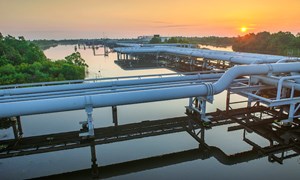October 2020 Vol. 75 No. 10
Washington Watch
Army Corps Proposes New Pipeline Permit
Stephen Barlas | Washington Editor
With a federal court in Montana having thrown a monkey wrench in pipeline use of an Army Corps wetlands permit, the Army Corps of Engineers (USACE) is now moving to make changes in its Nationwide Permit 12, which allows pipelines – whose construction poses minimal impact on wetlands – to enter a simple, quick regulatory permit approval process.
The Montana court ruled in a case initiated by Northern Plains Resource Council. It argued Keystone XL should not have been approved because USACE acted “arbitrarily and capriciously” in not considering requirements of the Endangered Species Act (ESA). USACE should have done that, the case claimed, by consulting with the U.S. Fish and Wildlife Service and National Marine Fisheries Service when it issued the latest version of the NWP12 in 2017. The Corps argued that consultation was unnecessary.
The Corps has 52 nationwide permits that allow companies doing a wide range of dredging around wetlands to avoid the major permitting requirements of the Clean Water Act, if they will have minimal adverse environmental impacts. NWP12 is a broad category, which includes construction of gas pipelines, electric utilities, and drinking water and sewage projects.
The Corps’ new proposal does not explicitly address the Montana court’s objection. Instead, the Corps proposes to split NWP12 into three separate categories: oil and gas pipelines, utility lines and water lines. In addition, the Corps would reduce the number of preconstruction notification requirements that a pipeline would have to meet, from seven to two.
Those PCNs, when reviewed by a Corps local engineer, can often result in district engineers adding activity-specific conditions to NWP authorizations to ensure that the adverse environmental effects are no more than minimal. These can include permit conditions, such as time-of-year restrictions and use of best management practices or compensatory mitigation requirements to offset authorized losses of jurisdictional waters and wetlands, so that the net adverse environmental effects are no more than minimal.
Beyond reducing the number of PCNs, the Corps is soliciting comments and suggestions for national standards or best management practices for oil and natural gas pipeline activities that would be appropriate to add to the NWP. There have apparently been complaints about “potential inconsistency in Corps regional conditions for the NWPs.” In the proposed rule, the Corps said that “adding national standards and best management practices to the text of proposed NWP 12 has potential to provide additional environmental protection and promote consistency, regulatory certainty, transparency and predictability.”





Comments